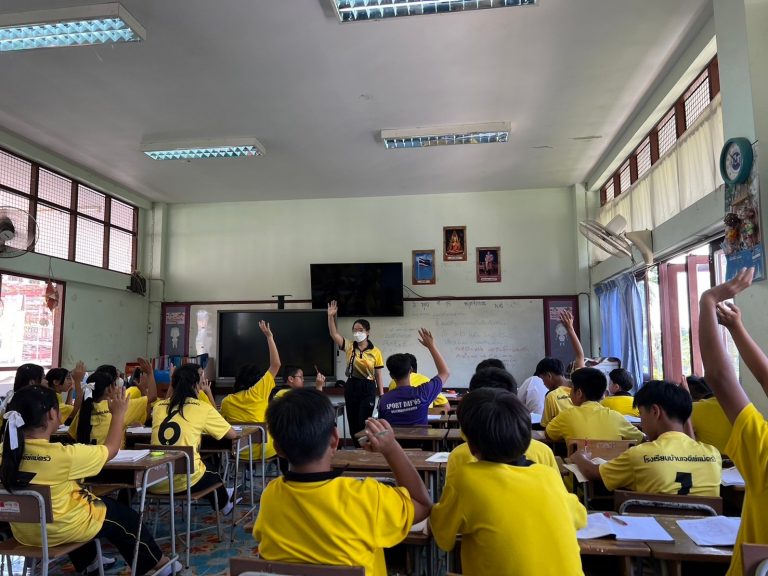Why Should We Prioritize Primary Education?
“Primary school is the foundation of a child's education. A solid foundation propels them forward, while a weak one creates hurdles down the road.” A reflection from "Yee" – Amree Sapaeing, a Leadership Fellow from cohort 10, who is currently teaching grades 7th and 8th science, and grades 1st and 3rd Eastern Economic Corridor (EEC) subject at Watmabkha School in Rayong, aligns with Teach For Thailand’s studies and literature reviews from organizations focusing on children, youth, and education. These sources highlight the challenges faced by primary school students.

The study indicates that one of the prominent challenges primary school students face stems from socioeconomic inequity, impacting their financial stability, ability to pay tuition fees, and overall well-being. Another study by the Equitable Education Fund (EEF) found that a significant number of students drop out before reaching middle school due to these issues.
“My students often face financial obstacles, and some parents don’t have time for their children,” reflects “Noey” – Suppakarn Munjai, another Leadership Fellow from cohort 10, who is currently teaching Mathematics for grades 6th and 7th at Baan Chedi Mae Khrua School in Chiang Mai. She highlights how these challenges obstruct her students’ educational opportunities.
Noey’s students, who include Thai, Tai Yai, and Myanmese nationals, face additional socioeconomic challenges that further affect their educational opportunities. “Lacking Thai nationality prevents these students from receiving certain scholarships, participating in some competitions, or traveling outside of the province,” she explains.
These restrictions and socioeconomic challenges significantly impact students’ attitudes, reducing their self-confidence and discouraging their efforts. “If we tell them everything is impossible or that they cannot achieve anything, they will lose confidence and stop trying altogether,” Noey emphasizes.
In addition to socioeconomic challenges, educational management in primary schools presents another obstacle. More than 83% of OBEC’s small primary schools lack sufficient teachers, hindering the comprehensive development of every student.
“A teacher has to teach all subjects,” said Yee. “Hence, they have to be strict with the students. But strictness leads to students rebelling, becoming stubborn, and not listening to them.”
To alleviate the impact of these challenges, both Noey and Yee agree that fostering positive attributes in students is crucial for improving their attitudes toward education. Highlighting the benefits of effort and perseverance can significantly enhance students’ engagement with school.
“From ages 5 to 12, students start to understand the causes and consequences of their efforts,” said Noey. “This is when they realize that, even if they are not great at everything, they can improve through effort. At the primary school level, they need to be heard, developed, and supported to learn these lessons.”
Demonstrating the value of effort, even in small tasks, is also important. In Yee’s case, every time his first graders submit their work or drawings, he listens attentively as they explain their pieces. He also responds by drawing or writing something for them.
“When they see me putting effort into drawing for them, they value their work more and keep it close,” he added.
Creating a safe environment and fostering healthy relationships between students and their surroundings can further alleviate challenges.
“One of the easiest ways to address these problems is to create a healthy relationship with their families. If students feel safe to tell their parents about their struggles at school, there is a greater chance of resolving these issues,” Noey reflected.
Regarding the school environment, Noey strives to be a supportive presence for her students. “I listen to and accept them without judgment, creating a safe space for them. As a result, they become more open to academic content.”
“For example, Mathematics is not a popular subject, but with a healthy relationship, students become more receptive. Now, they ask me questions about the subject and even request additional exercises.”
“Developing students from primary school and encouraging a positive attitude makes them more self-aware and patient in achieving their dreams,” Noey concluded.
Teach For Thailand has conducted extensive research to guide the Fellow Leadership Program towards primary schools. This initiative aims to address inequities and foster positive development in young students. The ultimate goal is to ensure that all children in Thailand have equal access to education and the ability to shape their own futures.
Join us in transforming and improving children’s lives by becoming part of our Fellow cohort 11, here.

